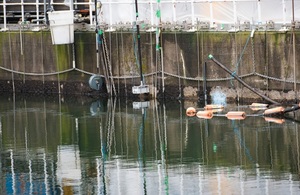A challenge shared is a problem halved...
The Game Changers programme – which sets up challenges to businesses to solve our decommissioning problems - is expanding to include Scottish nuclear site, Dounreay.

One of the challenges is to seek improved technology for the removal of contaminated concrete from walls and floors of ponds.
Bringing in the Scottish site – which shares many of the challenges we face – means we can hold joint challenges – developing solutions which can be used across the sites and saving time and money.
Dounreay is Scotland’s largest decommissioning project and is internationally recognised as one of the most complex nuclear site closure schemes.
Two new challenges mark the Game Changers partnership. One seeks improved technology for the removal of contaminated concrete from walls and floors of ponds. The other aims to improve organic residue detection in pipes and vessels.
The challenges are open to any organisation, of any size, from any sector that believes they may have technology that could prove useful.
Like us, Dounreay is part of the Nuclear Decommissioning Authority (NDA) estate and shares goals and common experiences. This will add up to economies of scale and value for money to the taxpayer through Game Changers.
Gordon Tait, Dounreay’s Deputy Head of Fuel Cycle Area said:
Dounreay and Sellafield Ltd share similar decommissioning challenges, dating from their common historic origins. Joining forces to solve them makes perfect sense for the sites, the NDA and the taxpayer.
Katherine Eilbeck, Sellafield Ltd’s Head of Research and Development added:
It’s fantastic to see the hard work from the technical teams of both sites pay-off in the publication of these joint challenge statements.
We always get a really good response from the supply chain from our Game Changers challenges and I’m looking forward to seeing the response we get to this call for innovation.
For further details on Game Changers, visit their website here.